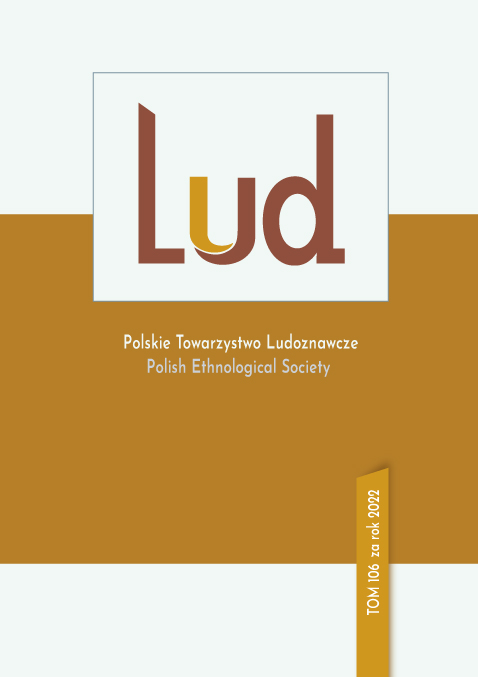Representativeness and cultural variation of ethnic groups from the former Polish-Lithuanian Commonwealth in Murdock’s Ethnographic Atlas
DOI:
https://doi.org/10.12775/lud106.2022.07Ključne reči
Ethnographic Atlas, the Polish-Lithuanian Commonwealth, methodology, cross-cultural studiesApstrakt
George Murdock's Ethnographic Atlas is one of the largest and most popular ethnographic databases in the world. It takes the form of a table containing systematically coded cultural characteristics for nearly 1,300 societies from around the world, and its structured form is particularly suited to cross-cultural quantitative research. One issue often raised in the context of using the Ethnographic Atlas is the underrepresentation of European ethnic groups. The aim of this paper is to examine how the database represents the territory of the Polish-Lithuanian Commonwealth: what are its deficiencies and what are the potential opportunities for its improvement in terms of representativeness and cultural diversity. For this purpose, a descriptive-statistical analysis of representativeness, cultural variation, and cultural similarities and differences between ethnic groups from the territory of the Commonwealth was conducted. The purpose of this paper is to help ethnographers decide what data in the Ethnographic Atlas can be added to or improved in a way that is effective in terms of the character and application of the dataset.
Reference
Alesina, A., Giuliano, P., Nunn, N. (2013). On the origins of gender roles: Women and the plough. The Quaterly Journal of Economics, 128, 2, 469-530. doi: 10.1093/qje/qjt005
Bahrami-Rad, D., Becker, A., Henrich J. (2021). Tabulated nonsense? Testing the validity of the Ethnographic Atlas. Economic Letters, 204, 109880. doi: 10.1016/j.econlet.2021.109880
Bentzen, J., Hariri, J. G., Robinson, J. (2019). Power and Persistence: The Indigenous Roots of Representative Democracy. The Economic Journal, 129 (618), 678-714. doi: 10.1111/ecoj.12568.
Bondarenko, D., Kazankov, A., Khaltourina, D., Korotayev, A. (2005). Ethnographic Atlas XXXI: Peoples of easternmost Europe. Ethnology, 44, 261-289. doi: 10.2307/3774059
Burton, M. L., Moore, C. C., Whiting, J. W. M., Romney, A. K., Aberle, D. F., Barcelo, J. A., Dow, M. M., Guyer, J. I., Kronenfeld, D. B., Levy, J. E., Linnekin, J. (1996). Regions Based on Social Structure. Current Anthropology, 37 (1), 87-123. doi: 10.1086/204474
Burton, M. L., White, D. C. (1987). Cross-Cultural Surveys Today. Annual Review of Anthropology, 16 (1), 143-160. doi: 10.1146/annurev.an.16.100187.001043
Gray, J. P. (1999). A corrected ethnographic atlas. World Cultures, 10 (1), 24-85.
Hajnal, J. (1965). European marriage patterns in perspective. In: D. V. Glass & D. E. C. Eversley (eds.), Population in History (p. 449-494). London: Edward Arn
Kirby, K. R., Gray, R. D., Greenhill, S. J., Jordan, F. M., Gomes-Ng, S., Bibiko, H.-J., Blasi, D. E., Botero, C. A., Bowern, C., Ember, C. R., Leehr, D., Low, B. S., McCarter, J., Divale, W., Gavin, M. C. (2016). D-PLACE: A Global Database of Cultural, Linguistic and Environmental Diversity. PLoS ONE, 11 (7), e0158391. doi:10.1371/journal.pone.0158391
Kolberg, O. (1964). Dzieła Wszystkie, t. 27: Mazowsze, cz. I. Wrocław, Poznań: Ludowa Spółdzielnia Wydawnicza, Polskie Wydawnictwo Muzyczne.
Korotayev, A., Kazankov, A., Borinskaya, S., Khaltourina, D., Bondarenko, D. (2004). Ethnographic atlas XXX: Peoples of Siberia. Ethnology, 43, 83-93. doi: 10.2307/3773857
Lowes, S. (2021). Chapter 6 - Ethnographic and field data in historical economics. In: A. Bisin, & G. Federico (eds.), The Handbook of Historical Economics (p. 147-177). Academic Press. doi: 10.1016/C2017-0-04055-7
Mayshar, J., Moav, O., Pascali, L. (2022). The Origin of the State: Land Productivity or Appropriability? Journal of Political Economy, 130 (4), 1091-1144. doi: 10.1086/718372
Murdock, G. P. (1957). World Ethnographic Sample. American Anthropologist, 59 (4), 664-687. doi: 10.1525/aa.1957.59.4.02a00090
Murdock, G. P. (1967). Ethnographic Atlas. Pittsburgh: University of Pittsburgh Press.
Rijpma, A., Carmichael, S. G. (2016). Testing Todd and Matching Murdock: Global Data on Historical Family Characteristics. Economic History of Developing Regions, 31 (1), 10-46. doi: 10.1080/20780389.2015.1114415
Tobin, J. (1990). The HRAF as Radical Text? Cultural Anthropology, 5, 473-487. doi: 10.1525/can.1990.5.4.02a00090
Wiślicz, T. (2018). Love in the fields. Relationships and marriage in rural Poland in the early modern age: Social imagery and personal experience. Warszawa: Instytut Historii im. Tadeusza Manteuffla Polskiej Akademii Nauk.
Downloads
Objavljeno
Kako citirati
Broj časopisa
Sekcija
Licenca
Sva prava zadržana (c) 2022 Rafał Miśta

Ovaj rad je pod Creative Commons Autorstvo-Bez prerada 4.0 Internacionalna licenca.
1. Autorzy udzielają wydawcy (Polskiemu Towarzystwu Ludoznawczemu) licencji niewyłącznej na korzystanie z utworu w następujących polach eksploatacji:
- utrwalanie Utworu/przedmiotu prawa pokrewnego;
- reprodukowanie (zwielokrotnienie) Utworu/przedmiotu prawa pokrewnego drukiem i techniką cyfrową (ebook, audiobook);
- wprowadzania do obrotu egzemplarzy zwielokrotnionego Utworu/przedmiotu prawa pokrewnego;
- wprowadzenie Utworu/przedmiotu prawa pokrewnego do pamięci komputera;
- rozpowszechnianie utworu w wersji elektronicznej w formule open access na licencji Creative Commons (CC BY - ND 4.0).
2. Autorzy udzielają wydawcy licencji nieodpłatnie.
3. Korzystanie przez wydawcę z utworu na ww. polach nie jest ograniczone czasowo, ilościowo i terytorialnie.
Stats
Number of views and downloads: 866
Number of citations: 0



